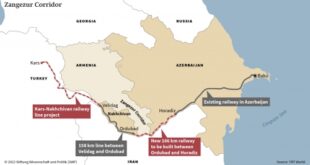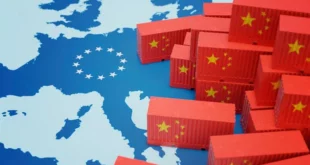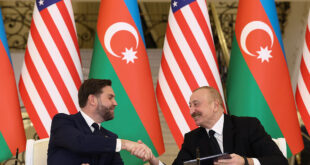Russia has at last learned the name of Vladimir Putin’s successor. On December 10, four pro-Kremlin’s parties, including the United Russia party-the winner of the recent parliament elections-put forward First Deputy Prime Minster Dmitry Medvedev as their candidate in the March 2008 presidential election. On the same day, Medvedev was anointed as the future Russian president by Vladimir Putin himself. At the same time, Dmitry Medvedev invited Putin to be prime minister in his government if Medvedev wins the March election.
Â
The chances of Dmitry Medvedev becoming Russia’s next president are high since there is no political force in sight capable of organizing significant resistance to the Kremlin’s “Operation Successor.” In the event Medvedev becomes the president and Putin the prime minister, it is probable that Russia will be ruled by this tandem for years to come. The question is how this new political structure of Russia will affect the Kremlin’s policy towards the most vulnerable region of the country-the North Caucasus.
Â
The Russian authorities did not forget about the North Caucasus even during the hottest days of “Operation Successor.” On December 11, just a day after the announcement that Dmitry Medvedev would run for president with Putin’s blessing, Nikolai Rogozhkin, the commander of Russia’s Interior Troops, declared that, according to his estimate, around 700 rebels are still active in the North Caucasus, Itar-Tass reported. Rogozhkin said that the insurgents were constantly moving from one Caucasian region to another, and that young men in Chechnya were still joining the ranks of the rebels. Federal Security Service (FSB) Director Nikolai Patrushev made a more optimistic statement about the Caucasus the same day, but he also admitted that “terrorism” continues to be a serious problem for Russia.
Â
It is no secret that the second military campaign in Chechnya made Vladimir Putin popular enough to become the Russian president. Putin’s image as a strong and tough leader was created in 1999-2000, when Russian forces occupied Chechnya again, using all available means to crush the Chechen resistance while ignoring the protests of other countries and Russian human rights activists. It should be noted that Putin’s image still strongly depends on the situation in the North Caucasus. His rating falls when the rebels conduct successful large-scale raids like the one in Ingushetia in 2004 and rises if Russian security forces conduct an effective crackdown on the Caucasian insurgency, as in 2006. Vladimir Putin is fully aware that his power and popularity depend not only on high prices of oil and natural gas but also on the situation in the volatile North Caucasus. Throughout his presidency, Vladimir Putin has paid close attention to Chechnya and other Caucasian republics. It appears that Dmitry Medvedev, unlike Vladimir Putin, does not have a Caucasian complex. Medvedev is not much involved in Chechen and Caucasian affairs. According to the newspaper Vedomosti, in 2000 Medvedev took part in building pro-Russian governance structures in the then newly occupied Chechen republic as a deputy head of Putin’s administration. His role was limited to proposing that a local prosecutor’s office be established in Chechnya first and that courts be set up only after that (Vedomosti, December 11).
Â
Medvedev visited Chechnya just once this year, to monitor how the so-called “national projects” are being implemented in the republic. He visited Chechen schools, hospitals, and made a speech to students at Chechen State University in the regional capital Grozny. During his visit, Medvedev promised a rosy future for the Chechen republic, but his speeches sound almost the same regardless of which Russian region he is visiting-whether it is war-torn Chechnya or Belgorod oblast in the Russian heartland. This year Vladimir Putin and Dmitry Medvedev also held a joint teleconference with principals of Russian schools located in several Russian regions, including the Chechen town of Urus-Martan.
Â
For Medvedev, Chechnya and the North Caucasus as a whole is just a Russian region where the economy and living standards of common people need to be improved. Medvedev has never commented on the military or political situation in the Russian south. Unlike Putin, it is difficult to imagine Medvedev saying that “terrorists” should be rubbed out anywhere, including the outhouse.
Â
If the situation in the North Caucasus remains as it is now, with no large-scale raids by rebels, “terrorist” acts or assassinations of senior political or military leaders, Dmitry Medvedev may not pay much attention to the region, giving the siloviki and Prime Minister Putin a free hand in their anti-insurgency activities. Still, nobody knows what Medvedev would do if he had to deal with a crisis like Beslan, Nord-Ost or the rebel raid on Nalchik in October 2005. During his nearly eight years as president and command-in-chief, Vladimir Putin has always chosen the toughest option in any crisis related to the Caucasus. Putin never hesitated-whether it was using gas against the “terrorists” in Moscow-which also harmed the hostages; using flame throwers that burned children hostages together with the “terrorists” in Beslan; shooting anybody on the streets, regardless of whether it was civilians or armed men, as in Nalchik.
Â
Will Medvedev be a hardliner like Putin on North Caucasus issues? Will he protest against FSB terror in the Caucasus, will he agree to anything that Ramzan Kadyrov does in Chechnya? Undoubtedly, if Putin becomes prime minister, he will try to control Caucasian policy as firmly as he does now. On the other hand, if the military and political situation in the North Caucasus goes really bad, as is already happening in Ingushetia, can and will Medvedev try to find an alternative to the harsh Caucasian policy of Vladimir Putin? The answer is probably no, but the next 2 years will likely provide an answer to that question.
Source: The Jamestown Foundation
 Eurasia Press & News
Eurasia Press & News



